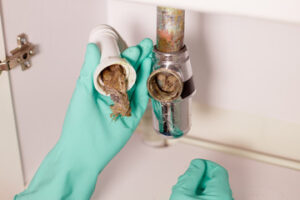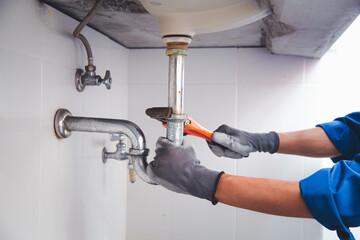Drain Cleaning – How To Get Rid Of A Clogged Drain In Your Home
Dirty drains are a fast track to spreading foul odors throughout your home. They also harbor dangerous bacteria and can lead to clogs, pipe fractures, and leaks.
There are many non-toxic DIY drain cleaning methods your grandmother would swear by. However, if your drain is severely clogged, you may need professional help. Click here at https://www.platinumplumbingsbc.com/ to consult with a professional.

Chemical Cleaners
Many people turn to chemical drain cleaners when faced with a stubborn clog. These liquid products are readily available in most hardware stores, and they often boast quick results. However, it is important to understand how these cleaners work before deciding whether they are safe to use in your home.
Most chemical drain cleaners are composed of high-intensity active ingredients, including hydrochloric acid (muriatic acid), sulfuric acid, sodium hydroxide (lye), and caustic potash. These chemicals are corrosive to both metal and plastic pipes, and they can also be harmful to your health.
If you are exposed to the fumes from these chemical cleaners, they can irritate your eyes, nose, and throat. Long-term exposure can even damage your lungs. If you spill any of these products on your skin, it can cause chemical burns. If your children or pets get into any of the solutions, they could experience severe burns and other dangerous side effects.
Another major problem with most chemical drain cleaners is that they create heat during their chemical reaction with the clog. This can melt or warp plastic pipes and it can cause metal pipes to crack and bulge. If you have older pipes, this could lead to serious leaks and water damage in your home.
It is also important to note that chemical drain cleaners are not a permanent solution to stubborn clogs. Most of these cleaners will dissolve the clog and then leave behind a residue that can re-clog your pipes over time. If you have a persistent clog, it may be necessary to call a plumber for professional help.
Oxidizing chemical cleaners are safer for your pipes than the other types of drain cleaners, but they aren’t as fast-acting or effective. These products typically require a few hours or overnight to break down and loosen your clog.
If you decide to use a chemical drain cleaner, it is important to follow the manufacturer’s instructions exactly. This will ensure that the product is safe for your pipes, and it will prevent any harm to your plumbing system or your health.
Enzymatic Cleaners
Enzymes are bacteria that eat away at organic materials such as soap scum, hair, grease, and food scraps that build up in drainpipes and sewer systems. They are a natural alternative to chemical cleaners that produce harmful fumes and can corrode drain pipes. Regular use of enzyme drain cleaners can keep your pipes in good condition and prevent serious clogs from developing.
Some liquid enzyme drain cleaners are available in ready-to-use bottles. Simply pour the liquid into the clogged drain and wait a few hours for it to work its magic. It may take longer than chemical-based drain cleaners, but it is safer for you and your pipes. It is also important to follow the instructions on the label for proper usage and safety precautions.
These biological drain cleaners are also better for the environment. They do not contain chemicals that can leak into soil and water, and they fortify the good bacteria in your septic system and drainage pipes.
The best part about using enzymatic drain cleaners is that they are safe for your family, pets, and the environment. They are also much cheaper than hiring professional drain cleaning services.
Liquid enzyme drain cleaner is available at most home improvement stores. Follow the product instructions on how to use it and how long to leave it in a drain before flushing. It is also recommended to treat the drains with baking soda first to soften any material that may be stuck in the pipe walls and make it easier for the enzymes to break it down.
It is also essential to note that enzyme drain cleaners are not as fast-acting as acid-based ones. You may need to leave them in a drain overnight or over a weekend for the best results. It is also important to regularly flush your pipes with hot water to avoid any buildup of material. Also, these cleaners usually have a shorter shelf life than chemical drain cleaners, so you should always check the expiration date before buying it. If you do find yourself in a desperate situation with a blocked drain, consider having an emergency plumber on standby to get the job done sooner.
Boiling Water
Boiling water is an excellent home remedy for many drain-related issues. But if the clog is caused by the typical culprits—dirt, hair, oil, and soap scum—it will likely not solve the problem. It can cause damage by softening plastic (such as PVC) pipes and seals.
Rather than pouring boiling water down the drain, which could cause serious damage, you should try another method for drain cleaning that is much safer. One option is to combine baking soda and vinegar. This mixture creates a chemical reaction that can help remove biofilm and break down grease, which can often lead to clogged drains.
To use this method, you should first heat a kettle of water to boil on the stove. Pour the hot water down the drain slowly, about a cup at a time. Allow each batch to sit for about a minute before proceeding to the next. This process should be repeated until the clog is removed or the smell is gone. You should then use a plunger to clean out the remainder of the pipe and flush it with warm water before turning on the faucet.
Baking soda is a kitchen staple and can be used for a variety of household tasks, including deodorizing drains and keeping them clear of grime and residue. You can also add a pinch of salt to the baking soda before pouring it down the drain to help dissolve grease and soap scum faster. It is recommended that you regularly clean your drains using this method, at least once a week.
While this homemade drain cleaner is not a solution for severe clogs, it can be effective on minor blockages and can prevent future buildups of hair, oil, grease, and soap scum. Just be sure to pour the mixture in small increments and allow it to sit for a minute before adding more. The mixture may fizz, so you should cover or plug the drain to avoid getting water back up your hands. The vinegar is an acid and will quickly react with the baking soda, so be careful not to pour too much down the drain.
Baking Soda And Vinegar
Baking soda and vinegar are household items that can do a great job of cleaning and deodorizing drains. These natural cleaners are inexpensive and easy to use. In addition, they are safer than chemical drain products and will not harm your pipes. Baking soda and vinegar can also help prevent clogs by keeping grease in solution. If you do notice a buildup of greasy gunk, pour a half cup of baking soda down the drain followed by half a cup of vinegar. Let the mixture sit for about an hour and then flush with hot water.
This simple hack can help keep your drains clean and odor-free, and it’s a good idea to use this method every few weeks. The acidic vinegar will help break down some of the fatty residues that may be building up in your drains, and the baking soda will scour the walls of your pipes, breaking up any small blockages.
The reaction of baking soda and vinegar creates carbon dioxide, which works like a fizzing drink to break down the grime that is stuck in your pipe. The boiling water used before and after the baking soda will also help loosen any greasy gunk, making it easier for gravity to push the gunk out of your pipe.
Unlike many store-bought drain cleaners, this homemade mixture does not contain sodium hydroxide, which can be deadly if it comes into contact with your skin. If you have a grease or fat blockage, this method may not be enough to clear it. For this type of clog, it’s a good idea to try one of the other methods listed here or call a professional plumber.
If you notice that your drain is smelling bad, pour a cup of baking soda down the drain and then follow it with a cup of white vinegar. Allow the mixture to sit for about an hour and then flush with a quart of boiling water. The bubbling action of the mixture will dislodge any fatty deposits and help your sinks and drains smell fresh again.


